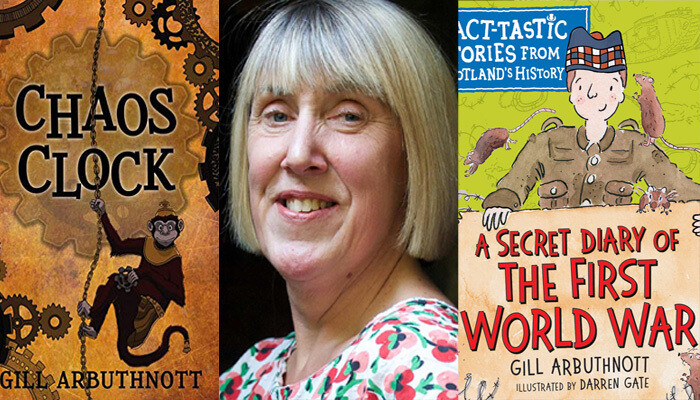Life @ EA

A Spotlight On: Gill Arbuthnott (EA Staff 1983-2016)
Welcome to our new blog series, where we shine a spotlight on the work and lives of some of our Accies. Each blog will look at each Accies journey having left the Academy, and will provide a little insight into their work now and their memories of their time at school.
We caught up with Gill Arbuthnott, former biology teacher at Henderson Row between 1983-2016. Gill has stepped away from the labs and has written an array of books, covering a variety of stories and topics. To find out more about Gill and her work, visit www.gillarbuthnott.com.
Following your teaching career at EA, what inspired you to become an author?
I was already an author while I was teaching: in fact, I’d been writing all through my teaching career although secretly – even from my family – and unsuccessfully, until The Chaos Clock was published in 2003. The family was a bit surprised to find out what I’d been up to.
Have you always wanted to be an author?
I’d dreamed of being an author more or less since I learned to read. I started writing stories in P5 and never really stopped and I would still be doing it even if I’d never had anything published.
What are your proudest achievements to date?
Personal: My two wonderful children.
Teaching: The close relationships that developed with many of my pupils over the years.
Writing: There’s nothing to beat the first time you see a book you’ve written in a real bookshop and the first time someone you’re not related to tells you they’ve enjoyed it, but a close second is finding that I’ve enthused readers about the wonders of science with my non-fiction.
Do you feel your time at the Academy prepared you/helped you for your career and if so, how?
Teaching made me very good at organising my time and meeting deadlines, something that certainly serves me in good stead with publishers. It improved my science knowledge base and taught me huge amounts about how to explain complex ideas simply and how to get and keep people’s attention. A terrible joke or a weird fact will take you a long way…
It gave me a good ear for the rhythms of dialogue, a great stock of names and, of course, a huge cast of characters I cheerfully ransack to populate my fiction!
Which book are you most proud of?
A Secret Diary of the First World War. I was surprised to be asked to write a history book (though Mr Harris was probably even more surprised when he found out…) and very daunted by the idea of trying to explain WW1 to 7-11 year olds in only 9000 words. Through Academy contacts including Tony Cook, I was given access to the trench diary of a teenage soldier called James Marchbank, from Dalkeith, whose family generously gave me permission to use his story. I was very aware that I had a great responsibility to tell it properly and it gave me amazing insights into what it must have been like for a very young man to be fighting then. One of the things that makes James’ story extraordinary is that because he was already a bugler in the Territorial Forces at the start of 1914 he was called up, although he was only 14, and sent – legally – to fight on the Western Front in August that year. He was there for most of the war apart from a brief interlude in Italy. I would love to find if he might have been the youngest legally serving soldier on the Western Front, but I’ve run out of ideas about how to go about this, so if anyone out there can help me…
Where do you find your inspiration for your stories?
Inspiration can come from anywhere: a scrap of overheard – or misheard – conversation; a photograph; a piece of music; a name. Sometimes there’s a character in my head demanding I find a way to let them out by writing a suitable story!
What advice or tips could you give to other Accies or current pupils at the Academy who are looking to become an author?
Don’t wait for ‘the right moment’ – it may never come. Start today. Don’t worry about writing the ‘right thing’ – there is no wrong thing. Just get on with it. It doesn’t really matter what you write about; start by simply making writing a habit. Never say you don’t have time. If you want to do this badly enough, you’ll find the time. Who needs clean floors or fancy meals or to watch Love Island? Just do it! You’ll have to be prepared to keep going in the face of rejection sometimes – that still happens to me even now that I’ve got over 20 books to my name – but if I can make a success of this, so can you!






